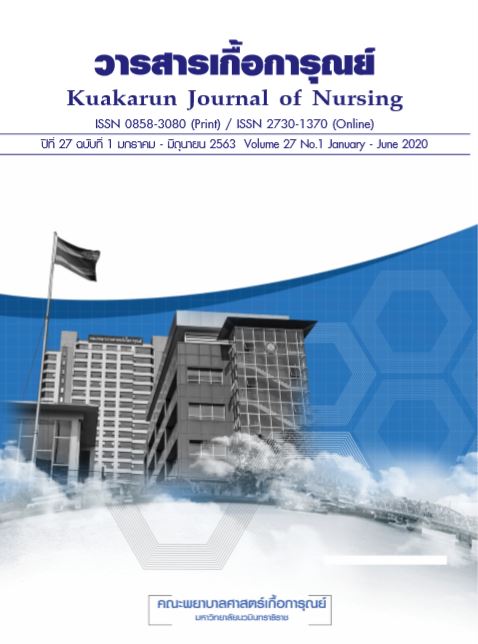ผลของโปรแกรมการฝึกพูดกับตัวเองทางบวกต่อภาวะซึมเศร้าในผู้ป่วยวัยรุ่นโรคเรื้อรัง
คำสำคัญ:
ภาวะซึมเศร้า, ผู้ป่วยวัยรุ่นโรคเรื้อรัง, โปรแกรมการฝึกพูดกับตัวเองทางบวกบทคัดย่อ
การวิจัยกึ่งทดลองนี้มีวัตถุประสงค์เพื่อศึกษาผลของการใช้โปรแกรมการฝึกพูดกับตัวเองทางบวกต่อ ภาวะซึมเศร้าในผู้ป่วยวัยรุ่นโรคเรื้อรัง กลุ่มตัวอย่างคือผู้ป่วยวัยรุ่นที่ป่วยด้วยโรคมะเร็ง โรคธาลัสซีเมีย และ โรคไต อายุ 15-21 ปี เข้ารับการรักษาในโรงพยาบาลแห่งหนึ่งในกรุงเทพมหานคร ผู้ป่วยสื่อสารได้ โดยได้รับการประเมินสุขภาพจิตและมีภาวะซึมเศร้าในระดับเล็กน้อยถึงปานกลาง คัดเลือกกลุ่มตัวอย่างแบบ เฉพาะเจาะจง 20 คนด้วยการจับคู่รายบุคคล ได้แก่ เพศ ชนิดของโรค และระดับภาวะซึมเศร้า แบ่งเป็น กลุ่มทดลอง 10 คน และกลุ่มควบคุม 10 คน เครื่องมือที่ใช้ในการวิจัยคือ 1) โปรแกรมการฝึกพูดกับตัวเอง ทางบวก ซึ่งผ่านการตรวจสอบความตรงตามเนื้อหาโดยผู้ทรงคุณวุฒิ 3 ท่าน 2) แบบสอบถามข้อมูล ส่วนบุคคล และแบบสอบถามสุขภาพผู้ป่วยซึ่งผ่านการตรวจสอบความเที่ยงของแบบสอบถามเท่ากับ .89 ทำการเก็บรวบรวมข้อมูลโดยกลุ่มทดลองได้รับโปรแกรมจำนวนทั้งหมด 8 ครั้ง ครั้งละ 60-90 นาที สัปดาห์ละ 3 ครั้ง จากนั้นประเมินภาวะซึมเศร้าหลังการได้รับโปรแกรม และระยะติดตามผล 1 เดือนกลุ่มควบคุมได้รับการดูแลตามปกติ ทำการวิเคราะห์ข้อมูลโดยใช้สถิติเชิงพรรณนา สถิติการทดสอบที และ สถิติการวิเคราะห์ความแปรปรวนแบบทางเดียวแบบวัดซ้ำ
ผลการศึกษาพบว่าคะแนนเฉลี่ยของภาวะซึมเศร้าในกลุ่มทดลองหลังจากสิ้นสุดการได้รับโปรแกรม และเมื่อติดตามผล 1 เดือนน้อยกว่าก่อนได้รับโปรแกรม อย่างมีนัยสำคัญทางสถิติที่ระดับ .01 (x̄ = 5.40, S.D = .49) และอย่างมีนัยสำคัญทางสถิติที่ระดับ .05 (x̄ = 6.30, S.D = .49) ตามลำดับ และกลุ่มทดลองมี คะแนนเฉลี่ยของภาวะซึมเศร้าน้อยกว่ากลุ่มควบคุม ทั้งในระยะหลังได้รับโปรแกรมและระยะติดตามผล 1 เดือน อย่างมีนัยสำคัญทางสถิติที่ .01 (x̄ = 3.50, 7.30, S.D = 2.01, 2.00; x̄ = 4.50, 8.10, S.D = 2.55, 1.79) ผลการศึกษาครั้งนี้แสดงให้เห็นว่าโปรแกรมการฝึกพูดกับตัวเองทางบวกสามารถลดภาวะซึมเศร้า ในผู้ป่วยวัยรุ่นโรคเรื้อรังได้ จึงควรส่งเสริมบุคลากรด้านสุขภาพนำโปรแกรมการบำบัดมาเป็นแนวทาง ในการบำบัดภาวะซึมเศร้าในกลุ่มผู้ป่วยวัยรุ่นโรคเรื้อรังต่อไป
เอกสารอ้างอิง
Ministry of Public Health. Health problem situation. eHealth strategy, Ministry of Public Health fiscal year 2016 [Internet]. 2016 [cited 2017 Dec 2]. Available from: http://bps.moph.go.th/new_bps/sites/default/files/mophplan_2559_final_0.pdf (in Thai)
Compas BE, Jaser SS, Dunn MJ, Rodriguez EM. Coping with chronic illness in childhood and adolescence. Annual Review of Clinical Psychology 2012;8:455-80.
Keawkingkraw S. Psychiatric nursing. Pathum Thani: Thammasat Printing House; 2011. (in Thai)
Beck AT, Rush AJ, Shaw BF, Emery G. Cognitive Therapy of depression. New York: Guilford Press; 1979.
Attharos T, Aphaijirarat J. Continuous care model in children with chronic diseases. Thai Journal of Nursing Council 2011;26 suppl:112-25. (in Thai)
Areemit R. Adolescents with chronic diseases. textbook of adolescent medicine. Nonthaburi: Parbpim Limited Partnership; 2016. (in Thai)
Wolff JC, Frazier EA, Esposito-Smythers C, Becker SJ, Burke TA, Cataldo A, et al. Negative cognitive style and perceived social support mediate the relationship between aggression and NSSI in hospitalized adolescents. Journal of Adolescence 2014;37(4):483-91.
Treenai S, Chaiyawat W. Illness experience of adolescent patients with leukemia. Thai Journal of Nursing Council 2006;21(3):47-60. (in Thai)
Teerarungsikul N, Sananreangsak S. Self-management experiences of children with thalassemia. The Journal of Faculty of Nursing Burapha University 2015;23(4):48-60. (in Thai)
Thapinta D. Depression: cognitive behavior therapy. Chiang Mai: Wanida Karnpim; 2013. (in Thai)
Braiker HB. The power of self-talk. Psychology Today 1989;23(12):23-7.
Davidhizar R, Shearer R. Self-talk for the licensed practical/vocational nurse. The Journal of Practical Nursing 2000;50(1):16-8.
Nelson-Jones R. Introduction to counselling skills: text and activities. SAGE Publications; 2009.
Mahakittikun K. Effect of positive self-talk training program on depression among adolescents. Chiang Mai: Chiang Mai University; 2005. (in Thai)
Nelson-Jones R. Thinking skills: managing and preventing personal problems. Pacific Grove (CA): Brooks/Cole Publishing Company; 1990.
Lotrakul M. Patient health questionnaire-9 (PHQ-9) [Internet]. 2016 [cited 2017 Dec 2]. Available from: http://www.cumentalhealth.com/index.php?lay=show&ac=article&Id=539909314 (in Thai)
Burgess ES, Haaga DAF. Appraisals, coping responses, and attributions as predictors of individual differences in negative emotions among pediatric cancer patients. Cognitive Therapy and Research 1998;22(5):457-73.
Thapar A, Collishaw S, Pine DS, Thapar AK. Depression in adolescence. The Lancet 2012;379(9820):1056-67.
Hamilton R, Miedema B, Macintyre L, Easley J. Using a positive self-talk intervention to enhance coping skills in breast cancer survivors: lessons from a community-based group delivery model. Current Oncology 2011;18(2):e46-e53.

















